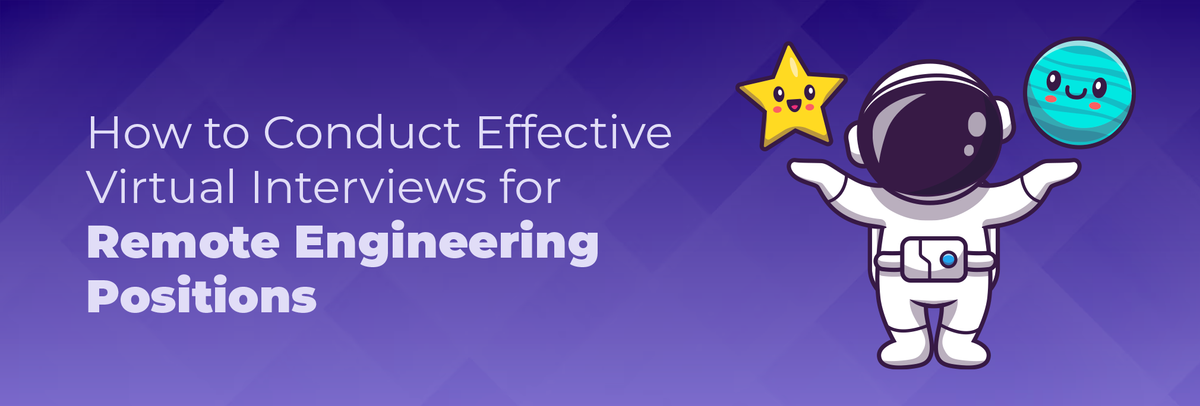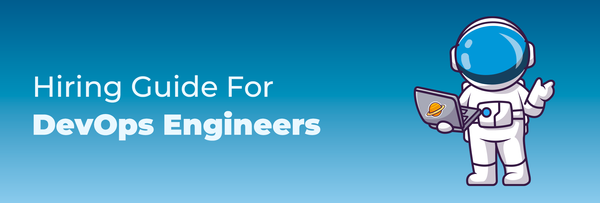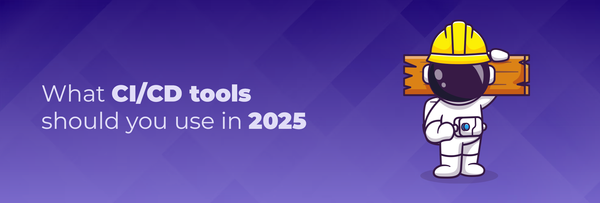How to Conduct Effective Virtual Interviews for Remote Engineering Positions

Struggling to navigate the complexities of virtual interviews for remote engineering positions?
You're not alone.
What is a virtual interview if not a challenging blend of assessing technical skills and gauging cultural fit through a screen?
Many hiring managers face difficulties in ensuring effective communication and accurate skill evaluation.
Our blog offers the solution.
With expert insights and practical tips, we’ll guide you through mastering the virtual interview process.
From setting up the right technology to crafting questions that reveal true potential, discover how to conduct seamless and effective virtual interviews to find the best engineering talent for your remote team.
5 Best Virtual Interview Tips to Look out for in 2024
Have you ever wondered which are the best practices for virtual interviews? Well, you are at the right place.
In 2024, when designing virtual interviews for remote engineering roles, it's crucial to consider the latest trends and statistics.
For instance, did you know that live video interviews are the preferred choice among 89% of hiring professionals?
With this in mind, here are some of the best online interview tips to embed in your hiring process.
- Select the Best Technology
Selecting the right technology is crucial for a successful virtual interview.
The tools you use can significantly impact the candidate's experience and the quality of your assessment.
Start by choosing a reliable video conferencing platform with clear audio and video quality, such as Zoom, Microsoft Teams, or Google Meet.
Ensure the platform supports screen sharing and has a stable connection to avoid technical glitches.
Did you know that Zoom experienced rapid growth in 2020 and 2021, with its number of active meeting participants increasing by an astounding 2,900%?
Additionally, consider integrating other tools like coding platforms (HackerRank, Codility) for real-time technical assessments and collaborative whiteboards (Miro, Mural) for problem-solving exercises.
Why Go For These Tools?
- HackerRank
HackerRank offers customizable coding assessments to evaluate candidates' programming skills and problem-solving abilities efficiently.
Its automated grading system provides instant feedback, streamlining the evaluation process.
- Codility
Codility provides coding tasks and challenges across various programming languages and difficulty levels.
With remote proctoring and detailed performance reports, it's trusted by organizations worldwide for its reliability in assessing technical skills.
- Miro
Miro is highly recommended for remote design interviews, but it's equally effective for whiteboarding during technical interviews.
To optimize its use, Miro suggests limiting the candidate's options to prevent overwhelm and setting strict time limits for tasks.
- Mural
Offering features similar to Miro, Mural serves as a "digital workspace for visual collaboration."
It supports collaborative whiteboarding and brainstorming, allowing participants to work together remotely on the same virtual page.
These technologies can help you evaluate the candidate’s skills more effectively, making the virtual interview process smoother and more efficient.
Utilizing video interviewing tools increases the likelihood for companies to enhance their cost per hire by 2.7 times.
- A Git Repository and a Platform for Coding
In a technical interview, you may require candidates to work with a specific codebase.
They might need to optimize existing code, develop a new module, or debug a program to ensure it functions correctly.
To facilitate this, provide a public Git repository from which the candidate can pull code.
Uploading code to GitHub is straightforward, and you can share the repository link with the candidate at the start of the interview.
Keep in mind that you'll need a unique code repository for each position you're hiring for to prevent a rejected candidate from potentially sharing your repository online.
- Emphasize Human Connection
To conduct an effective remote interview, dedicate time for an informal chat either at the beginning or end of the session.
This encourages candidates to open up and share more about themselves beyond their qualifications and technical skills.
Such informal interactions offer valuable insights into a candidate's personality, cultural fit within the organization, and ability to build relationships remotely—all crucial for long-term success in a remote work environment.
Given that 65% of candidates lose interest in a job after a bad interview experience, ensuring a positive and personal interaction is vital.
Connecting on a personal level shows that, as recruiters and hiring managers, we care about candidates' career journeys and overall well-being.
It also helps candidates envision themselves as part of our company culture, fostering trust and authenticity from the start.
By emphasizing human connection, we can discover hidden talents, identify cultural alignment, and ultimately make more informed hiring decisions.
- Integrate Behavioral and Situational Queries
To delve into a candidate's capabilities, integrate behavioral and situational inquiries into your interview.
These prompts prompt candidates to draw from past experiences or hypothetical scenarios, providing insight into their problem-solving and decision-making prowess.
For instance, posing a question like, "Have you ever faced challenges coordinating with team members in different time zones? How did you manage it?" unveils their communication and teamwork skills.
This method enables evaluation not only of a candidate's knowledge but also their application of it in practical contexts.
- After-Interview Follow-Up
One of the key online interview tips is to ensure you follow up afterward.
It's essential to follow up after the interview, irrespective of your decision regarding the candidate's application.
This action demonstrates respect for the interviewee's time and effort while also providing an opportunity to collect feedback on your interview process, which can inform future improvements.
Even if a final decision hasn't been made regarding the position, it's courteous to reach out to the candidate.
In your message, communicate your ongoing interview plans until a specific date and provide an expected timeframe for further communication.
This transparency allows candidates to plan accordingly and appreciate your professionalism.
If you opt not to extend an offer to the candidate, offering constructive feedback can be beneficial for their future job search endeavors.
Provide honest, tactful feedback focusing on both hard and soft skills that could enhance their performance in future interviews.
Avoid personal or discriminatory comments and express gratitude for their time and interest in your company.
Many hiring managers utilize structured feedback forms to gather insights from interviewees.
This approach allows candidates to share their experiences and suggestions, contributing to the enhancement of the candidate experience and remote interview process.
How to Conduct a 5-Star Interview
Table 1 - Dos for conducting effective virtual interviews
Build the Best Remote Engineering Team with Teamo's Talent Solution
Take your remote engineering team to greater heights through Teamo's innovative talent solution!
As you focus on conducting effective virtual interviews for remote engineering positions, Teamo offers a seamless integration of top-tier, pre-screened software developers from emerging markets into your remote workforce.
- Seamless Collaboration: Our platform ensures seamless integration, enabling your remote developers to collaborate effectively with your existing engineering team, regardless of geographical barriers.
- Rapid Expansion: Quickly scale your engineering team without compromising on quality or speed. Teamo provides fast and affordable access to talent, allowing you to meet project demands and deadlines with ease.
- Quality Assurance: Rest assured that every developer on our platform undergoes extensive vetting, ensuring you have access to skilled professionals who can contribute meaningfully to your projects.
Discover how you can hire developers with Teamo now!
FAQs
- What is the smart method of interviewing?
SMART interviewing objectives encompass a methodical and purpose-driven strategy utilizing the Specific, Measurable, Achievable, Relevant, and Time-bound framework.
This guarantees clearly delineated, quantifiable, attainable, job-appropriate goals within a defined interview timeline.
- How do you shoot a remote interview?
Shooting a remote interview involves several steps to ensure a smooth and successful process:
- Determine the Purpose of Your Video: Clarify the objective of your interview to guide your planning and execution effectively.
- Choose Your Interviewee: Select candidates who are well-suited for the role and possess the desired qualifications and skills.
- Plan Your Interview in Advance: Outline the structure of your interview, including the topics to be covered and the format of questioning.
- Select Your Software: Choose a reliable video conferencing platform that supports high-quality audio and video transmission.
- Consider Offering an Equipment Kit: If feasible, provide interviewees with necessary equipment such as webcams or microphones to ensure optimal audiovisual quality.
- Send Your Interviewee Topics and/or Questions in Advance: Provide interviewees with a list of topics or questions to be discussed during the interview, allowing them time to prepare thoughtful responses.
- Give Your Interviewee Tips: Offer guidance on best practices for remote interviews, such as ensuring a quiet environment, dressing professionally, and maintaining eye contact with the camera.
- Create and Send a Quick Video Intro: Introduce yourself and the purpose of the interview through a brief video message, establishing rapport and setting expectations for the interview process.
By following these comprehensive steps, you can conduct remote interviews with confidence and efficiency, ensuring a productive exchange of information between you and your interviewee.
- What is the star method when interviewing?
The STAR method is a strategic approach used during interviews to respond effectively to behavioral-based questions.
It stands for Situation, Task, Action, and Result.
Candidates use this method to provide structured and detailed answers by describing a specific situation, outlining the tasks involved, explaining the actions they took, and discussing the results achieved.




